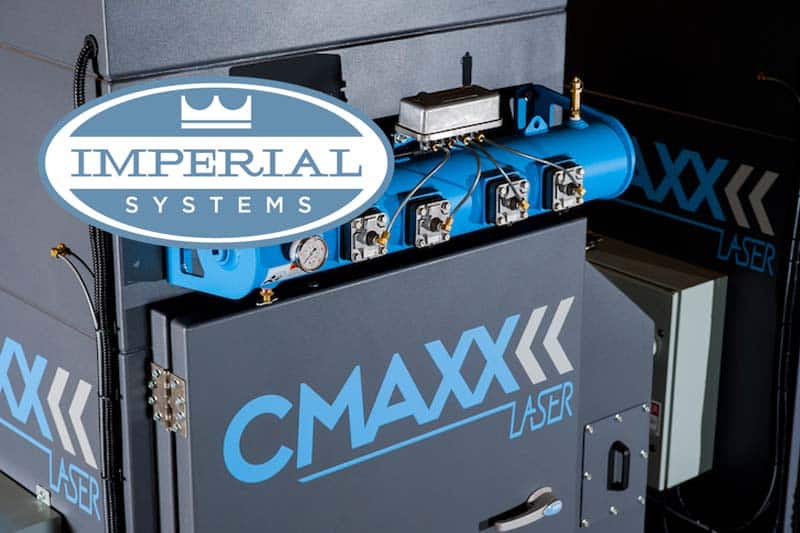
by Imperial Systems | Oct 19, 2016 | Uncategorized
When Water Turns a Fire Into an Explosion
A combustible dust explosion is an ever-present danger for workers in many industries. These two examples show that despite increased awareness, explosive dust still puts lives at risk. One thing they both have in common: water may have actually made them much worse.
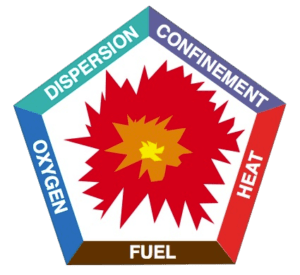
Case #1: Grain Dust
The first example shows how even things that seem like safe and practical fire-fighting measures can lead to disaster. In May, a grain dust explosion occurred in a silo. It injured a worker who was attempting to put out a dust fire with water.
Because the very fine dust was contained in the silo, all the criteria for an explosion were present… except for one. The dust provided fuel for a fire, and the open silo hatch provided oxygen. With the material confined in the closed space of the silo and an ignition source in the form of a grain dryer, the dust explosion danger was high.
Ironically, it was the worker spraying water onto the fire that created the explosion by adding the last element: dispersal of the dust. Water hitting the dust added more air and also raised a cloud of dust. Dust suspended in the air turns the situation from a fire into an explosion. In this case, it blew the roof off the silo and caused serious injuries.
Case #2: Fish Meal Dust
The second example is in some ways a classic industrial dust explosion, except that the material isn’t one you’d expect. In September, a seafood processing plant was seriously damaged and had to be shut down because of an explosion caused by the ignition of fish meal dust.
Fish meal is a fine, dry powder that manufacturers often make into fish food. A local official noted that this is the third time he knows of that fish meal has caused an explosion at a local plant. In this case, a burst pipe may have created an explosion by causing dust to become airborne.
While people don’t think of fish as being explosive, they usually don’t think of metal as being explosive either. Both of them pose an explosion danger when in dust form.
While we talk a lot about combustible metal dust and fumes because many of the industries we work with use metals, organic dusts like grain, spices, powdered milk and egg, sugar, tobacco, and yes, even fish are dangerously explosive if all the right elements are present.
Secondary Explosions from Airborne Dust
While many places that produce metal dust are aware of the risks, some places that produce organic dust don’t realize the danger it poses, or how important a dust collection system is for controlling and handling dust. The most catastrophic damage is often done by secondary explosions: a small dust explosion causes accumulated dust to be dispersed in the air, causing a much larger explosion. Spraying water on a dust fire can do the same thing, sending dust into the air.
Minimize Dust Explosion Danger
Removing dust from the facility and collecting it with a dust collection system designed to prevent or safely control explosions is an important safety strategy. Making sure that dust will not disperse in the air is another key to explosion prevention. In any situation with combustible dust, equip the system with safety features. Spark arrestors, explosion vent panels, and chemical suppressors can curtail the dust explosion danger in your factory.
Reference:
http://www.ktoo.org/2016/09/20/explosion-westward-seafoods-sparks-police-investigation/
http://www.adn.com/alaska-news/rural-alaska/2016/09/21/official-blames-fish-meal-dust-in-100k-explosion-at-dutch-harbor-seafood-plant/
https://www.commerce.wa.gov.au/sites/default/files/atoms/files/5-2016_grain_fire_and_dust_explosion_in_silo.pdf
http://content.safetyculture.com.au/news/index.php/10/safety-alert-issued-grain-fire-dust-explosion-silo/#.V_-WMugrKM-
Read more
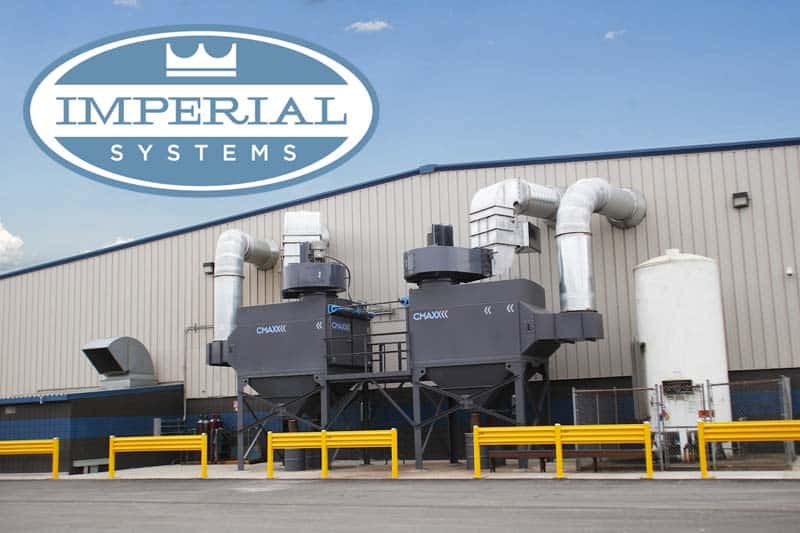
by Imperial Systems | Aug 2, 2016 | Uncategorized
Whether you are a new manufacturing business or just branching out into new territory, if you are going to get into the metalworking field, addressing industrial dust control solutions demand some serious consideration. Not only do you have the safety of your work space to think about, but unchecked dust and fumes can also pose health hazards to those working in it. We’ve spent nearly 15 years considering the challenges of industrial dust accumulation and control, and we have developed the solutions our customers need. Discover the facts you need about dust control for your business so things run safely and smoothly.
Meet Safety Standards
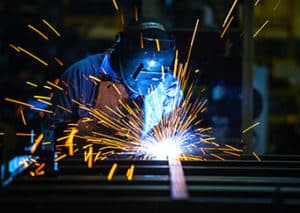 An accumulation of dust in any industrial setting poses a threat to the health and safety of those working there. This is especially true in the world of metalworking where the fine dust particles may be especially toxic. In light of this threat, the Occupational Safety and Health Administration (OSHA) has established standards of safety that must be followed in any such industrial setting. These address not only inhaled dust but also the threat of combustibility through its accumulation. Check out the latest combustible dust update HERE. When you look for an industrial dust control system, begin by ensuring that it meets these and other industry standards.
An accumulation of dust in any industrial setting poses a threat to the health and safety of those working there. This is especially true in the world of metalworking where the fine dust particles may be especially toxic. In light of this threat, the Occupational Safety and Health Administration (OSHA) has established standards of safety that must be followed in any such industrial setting. These address not only inhaled dust but also the threat of combustibility through its accumulation. Check out the latest combustible dust update HERE. When you look for an industrial dust control system, begin by ensuring that it meets these and other industry standards.
Anticipate Dust And Fumes
As you consider a system to provide dust control for your workspace, make sure you take fumes into account as well. In many metalworking processes, noxious fumes are created which are more than unpleasant; they can be increasingly harmful when inhaled. Not all industrial dust control systems are created to handle this dual threat, so it is vital to choose a collector that can manage both dust and fume generated by metalwork manufacturing.
Your Industrial Dust Control Solutions Experts
Whether you need dust and fume filtration or just a dust collection system, Imperial Systems is your industrial dust control headquarters. We manufacture the most efficient, strongest, and longest-lasting systems and filters in the industry. Through these products, we have become well-known for our dedication to quality, value, and safety. Our outstanding line of equipment includes:
- CMAXX™ Dust Collector System
- DeltaMAXX™ Cartridge Filters
- CMAXX™ Laser Fume Extraction System
- Spark Arrestor
- Explosion Isolation Valve
- Custom Ductwork & Fittings
- Heavy Duty Abort Gates
- and more!
Most of our products are available to ship within 24 hours. For more information about our products and how we can support your metalworking business, contact us today.
Read more

by Imperial Systems | May 25, 2016 | Uncategorized
Ever wonder how much facilities like yours might be paying when they don’t have proper dust control?
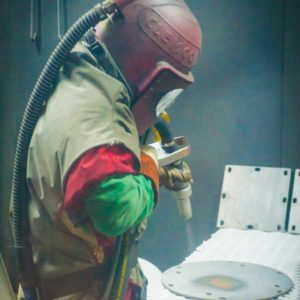
When a facility doesn’t have proper dust control equipment installed, or when they fail to protect their workers from welding fumes or combustible dust, fines from OSHA may be in your future. Since March of 2016, numerous fines OSHA have been handed out for respiratory hazard violations:
- A cement company in Ohio is looking at a $92,000 fine for violations that include silica dust exposure
- A company’s abrasive blasting process without proper air filtration resulted in a $121,000 fine for exposing workers to airborne lead
- Fines for a power equipment manufacturer may total $77,000 for violations including failure to evaluate dust hazards
- A pallet manufacturer is facing $152,000 in fines for safety hazards including combustible dust build-up
- Exposing workers to lead and cadmium dust at seven times the permissible limit will cost a Pennsylvania foundry $42,000
- A minerals company that failed to provide proper air quality and dust control exposed workers to lead and arsenic, which may cost them $106,000
Is your dust collection system ensuring you don’t face these kinds of fines? Imperial Systems can help! Our custom-designed dust control systems will help keep your facility and your employees safe. Call one of our knowledgeable team members today to learn more! 800-918-3013.
Read more



 An accumulation of dust in any industrial setting poses a threat to the health and safety of those working there. This is especially true in the world of metalworking where the fine dust particles may be especially toxic. In light of this threat, the Occupational Safety and Health Administration (OSHA) has established standards of safety that must be followed in any such industrial setting. These address not only inhaled dust but also the threat of combustibility through its accumulation. Check out the latest combustible dust update
An accumulation of dust in any industrial setting poses a threat to the health and safety of those working there. This is especially true in the world of metalworking where the fine dust particles may be especially toxic. In light of this threat, the Occupational Safety and Health Administration (OSHA) has established standards of safety that must be followed in any such industrial setting. These address not only inhaled dust but also the threat of combustibility through its accumulation. Check out the latest combustible dust update 